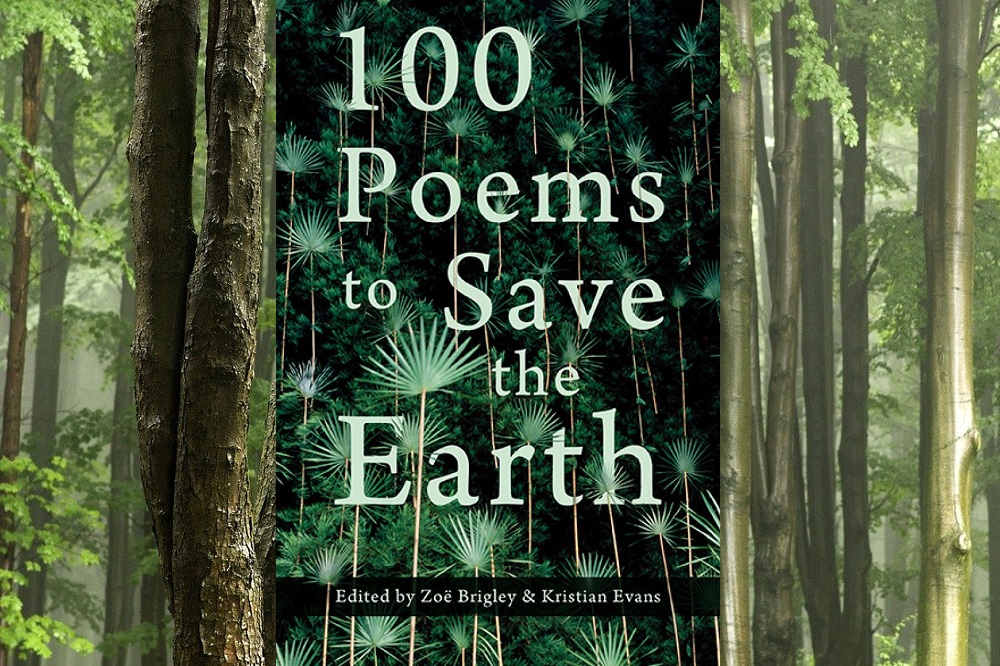Review: 100 Poems to Save the Earth is a timely collection with many poems which lodge like limpets in the mind

Jon Gower
The appearance of this poetry curation could hardly be more timely given the publication of the Intergovernmental Panel on Climate Change which sounded a clear ‘code red’ for climate catastrophe, even as enormous swathes of California and Siberia were swept by wildfires while tourists ploshed through a flooded St Mark’s Square in Venice. The editors anticipate that obvious question – how can poetry save the world? – in their introduction. Here they suggest that poetry can
call us to stay awake, to find the words to describe how it feels, to sing to what hurts, to reach out, to attend more closely and with more care, to each other, and to all ourt fellow species, to see all things as our kin.
That close attention and care is abundant in its pages. In one of the opening poems ‘A Portable Paradise’ by Robert Robinson he describes a treasure, handed on to him collaterally by his grandmother. The poet doesn’t give us its dimensions, or tell us what it is exactly but he does share his gran’s advice that he should keep it on his person lest it be stolen. Then, should the stresses of life prove to be too much
Get yourself to an empty room – be it hotel,
hostel or hovel – find a lamp
and empty your paradise onto a desk;
your white sands, green hills and fresh fish.
shine the lamp on it like the fresh hope
of morning, and keep staring at it till you sleep.
The two editors have carefully and judiciously drawn on a wide range of poets from around the world – including a fair smattering of Welsh poets such as Paul Henry, Deryn Rees-Jones, Richard Gwyn, Rhian Edwards, Owen Sheers and Grahame Davies. The works often link thematically, echoing each other, braiding in meaning, theme or in message. So we have a number of poems celebrating watercourses such as rivers and lakes, or ones about weeds such as knotweed and couch grass, which, let’s face it, are very seldom celebrated in verse. Even some of the other plants, such as the medicinal mugwort don’t get as much attention as, say roses and lillies. Yet Robert Minhinnick is a definite and attentive celebrant of its qualities, as ‘The Magician’ in his poem lists the plant’s healing qualities, from the gold dust of its pollen to its aroma, which is preferable to ‘wormwood and the silver salvias/Though savory I suppose must run it close.’
Celebration
That sense of attentive celebration is present in a few of the poems here presented, from David Morley’s ‘Chorus’ which runs as a ticker-tape list of the dawn chorus’s constituent voices, from the swallow which ‘unmakes the Spring and names the Summer,’ the nuthatch which ‘nails another hatch shut’ and the rook which ‘roots into roadkill for the heart and the hardware.’ It’s a poem that ends as if the poet himself is running out of words:
The dawn is completely composed. The pens of its beaks are dry
Day will never sound the same, nor night know which song wakes her.
The wonders and complexities of the natural world recur throughout the collection, from Bob Hicok’s ‘Lush’ which examines the ways trees communicate ‘through roots that braid’ to Wendell Berry, who escapes despair for the world by ‘lying down where the wood drake/rests in his beauty on the water, and the great heron feeds.’ But this is not a romantic or pastoral assemblage – there are poems about the indestructibility of plastic and about screaming fighter bombers turning houses into flour dust. Others, such as Paula Meehan’s ‘Death of a Field’ chart that which is lost when property developers buy some land, with the ‘end of hidey holes,’ the loss of the magpies’ sound of ‘flying castanets’ and the disappearance of its flora, the yearning yarrow and the scarlet pimpernel not to mention the ‘woodpigeons in the willow’ and the wagtail in the elder which sings its ‘hungry summer song.’
Meanwhile John Burnside’s respectful ‘Earth’ commemorates eco-activists such as David “Gypsy” Chain, who was killed in 1998 while protesting the clearcutting of Californian Redwoods as he ‘trusted to the earth/the heart he had kept intact…’ And in one of the most restorative and uplifting poems, Camille T. Dungy’s ‘Trophic Cascade’ there is a bountiful account of re-wilding and what happened in Yellowstone when they reintroduced the grey wolf. This led to trees growing up ‘beyond the deer stunt/of the midcentury’ and with that the return of underbrush which ‘warrened snowshoe hare’ and soon the place, and thus the poem is full of songbirds, muskrats and American dippers while abundant berries bring in the bears.
There are many poems here which lodge like limpets in the mind. One such is American poet Ross Gay’s ‘A Small Needful Fact’ which concerns Eric Garner, who died in New York City in 1994 as a result of being placed in a police chokehold. Eric Garner, the poem tells us, worked for some time for the city’s Parks and Recreation Horticulture Department and suggests that it is therefore likely that with his hands:
he put gently into the earth
some plants which, most likely,
some of them, in all likelihood,
continue to grow, continue
to do what such plants do, like house
and feed small creatures,
like being pleasant to touch and smell,
like converting sunlight
into food, like making it easier
for us to breathe.
100 Poems to Save the World is published by Seren and can be purchased here.
Support our Nation today
For the price of a cup of coffee a month you can help us create an independent, not-for-profit, national news service for the people of Wales, by the people of Wales.






